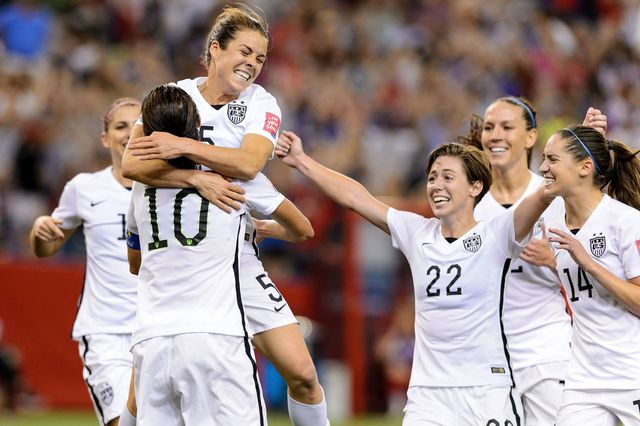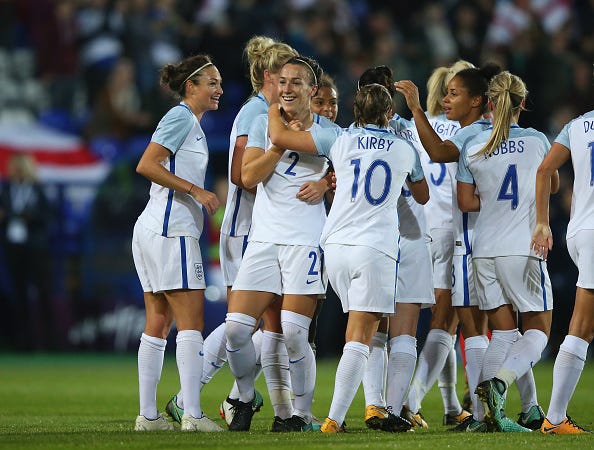2017 saw a groundbreaking summer for women's football.
The England women's team (the aptly named, Lionesses) showed their full devotion to reaching the World Cup 2019 with an impressive 6-0 qualifying win against Russia. Up 2-0 in just 13 minutes of play, they were fiercely determined to exceed, their world No.3 ranking.
They are the first England team to make it into the top four over two successive tournaments, in over half a century. Sorry boys, the Lionesses are a true football force.
They may not be household names, exist on FIFA screens or sell out stadiums yet, but female footie is definitely on the up.
A peak audience of 3.3 million people tuned in to watch the Euro quarter-final against France - the biggest ever for women's football - and the number of UK female players has grown five times since 1985.
Engrossed with football fever, ELLE went to the launch of the FA Women's Super League to meet some the players who are changing the game. Here's what we learned...
1. Women's football was banned in 1921.
Just as women fought for the vote, back in the 1920s, they had to fight to be allowed to kick a ball.
On 5th December 1921, the Football Association banned women from playing the sport on FA-associated pitches. This meant that women could no longer play at real grounds with spectators or a referee.
The FA made a statement branding the game as, "quite unsuitable for females" and something that "ought not to be encouraged". Keen players suddenly found themselves quietly averted back into the domestic realm of their "right and proper place".
The ban was finally lifted in 1971, following the formation of the Women's Football Association (WFA) a couple of years earlier.
2. The Women's Super League just got a major shakeup..
2017 saw a switch in the English Women's Super League from a summer to a winter calendar.
Why should you care? The shift means girls now have the chance of success at major tournaments, it's their chance to reach the top tier of professional teams.
The fact that the girls are now part of the traditional football culture of playing from autumn to spring is a huge move. 1-0 to feminism.
3. The women's game is growing.
UEFA reported that there are now a total of 1,270 million registered female players across the continent and that the number of professional and semi-professional female players has increased from 1,303 in 2012 to 2,853 in 2017.
After 20 years of seeing the female sport grow, Chelsea player Katie Chapman says that "it's taken a long time to get to this point, but it's great to see where it's got to and how women's football has grown".
4. Women were always better at multi-tasking.
Inspiringly, a lot of female players commit to their footie dreams whilst also maintaining a family and a career.
Women's Tottenham player, Jenna Schillaci, works the 9 to 5 as well as being fully committed to her sport, "we train three nights a week, work five days a week and then we play on a Sunday. You've just got to balance it, but when you're doing what you love it's easy".
5. Women footballers earn A LOT less money.
Although the number of high-earning female players is rising, the gender pay gap is severely unequal when it comes to football.
Women's football doesn't pay as much as men's – with a top bracket of around £70,000 a year compared to Wayne Rooney's £300,000 a week. Despite the pay gap, female footballers make it work. Jordan Nobbs says, "putting on an England shirt and playing in front of 30,000 people. It just doesn't get much better than that."
6. It is more open-minded.
Where homophobia is rife in the men's games, Katie says that the women's game is "a very family-friendly game. I think a lot of parents find that they can bring their children to a game and won't experience what they would at a men's match like swearing. The atmosphere is much more relaxed".
7. The women's England team are far more superior.
We're not even biased. They've qualified for the FIFA Women's World Cup four times, reaching the quarter final stage on the first three occasions and finishing third in 2015. They just came 3rd in the 2017 Euros, despite being a relatively new team taken on by the FA in 1993.
They won't stop there. England Captain, Steph Haughton, says that "we just need to continue to grow the game, we need to work to drive attendance as much as we can, we need to increase the standard of our game every single year, which it is".
8. They've also got a higher FIFA ranking than the men.
Women = 3rd
Men = 15th
Need we say any more?
9. Football and fashion go hand in hand.
For too long, sporting magazines have centred around the white, middle class football-loving male. Felicia Pennant and her majority all-female editorial team are fighting this homogenous culture with football zine, Season.
A cross between a fashion magazine and a football zine, Season unites fans of both.
The first issue, focusing on the female fan, features interviews with British Vogue's associate fashion editor Verity Parker and provides a platform for fans that love football just as much as they do fashion.
Another zine for the female football fanatic is Girlfans, "the digital mini that turns the lens on an often overlooked part of the fanbase – women" (Newspaper Club). Girlfans celebrates the style and energy of female fans, proving that women can be as devoted to football as men, just better dressers.
10. You can get involved.
Football collectives like 'Romance FC' and charities such as 'Women in Sport' are on a mission to get more girls playing football. Women in Sport work towards advancing gender equality through sport, whilst Romance FC, based in Hackney and Tottenham, play football, produce events, "and show love". They offer free beginners sessions, match screenings and tournaments where any girl can get involved.
The FA are encouraging girls to sign up to their local football teams. Their website enables you to search for your nearest team, so you can "emulate the likes of England captain Steph Houghton, World Cup star Lucy Bronze and 150-cap legend Fara Williams". Want to get involved?














